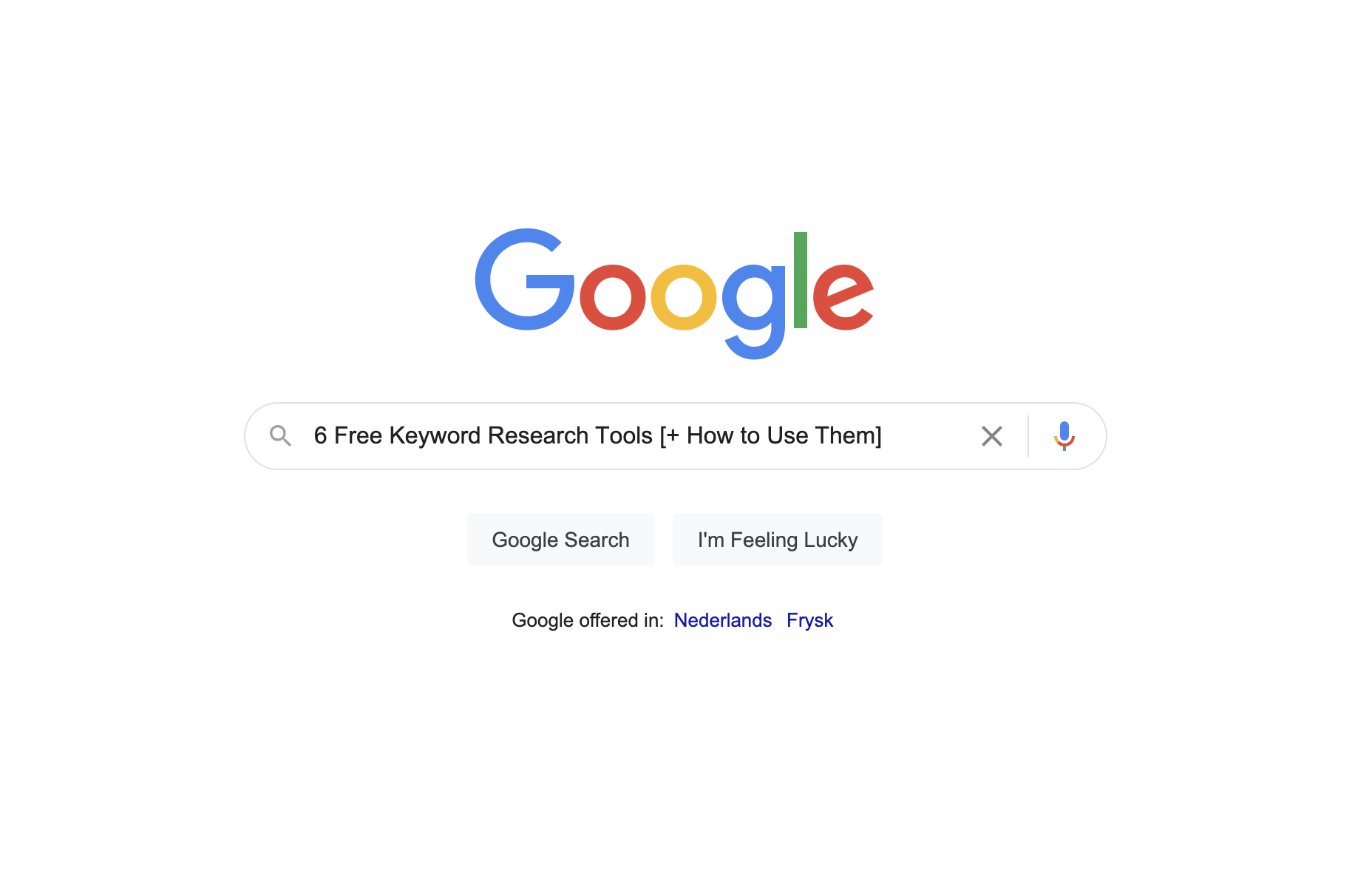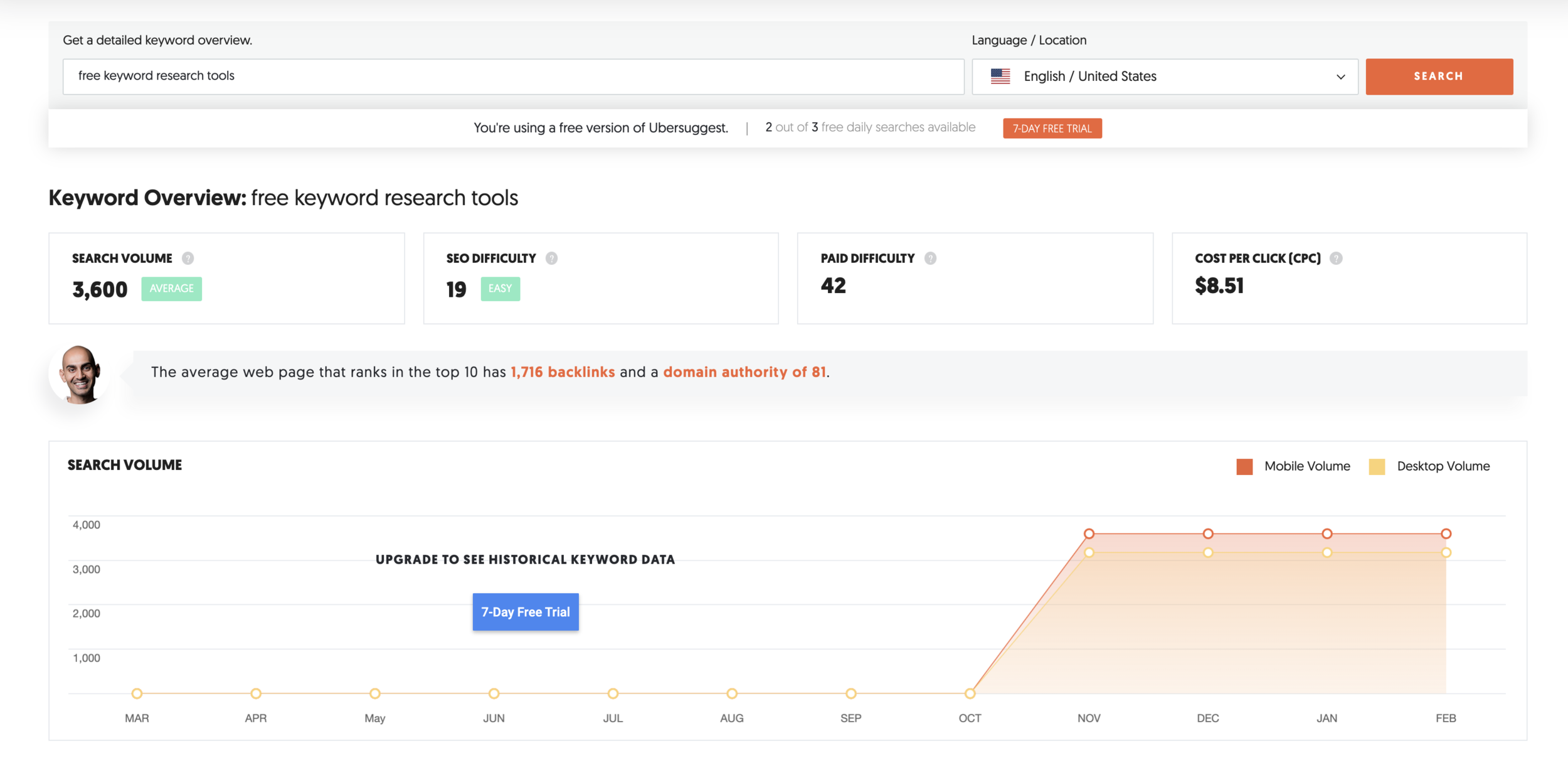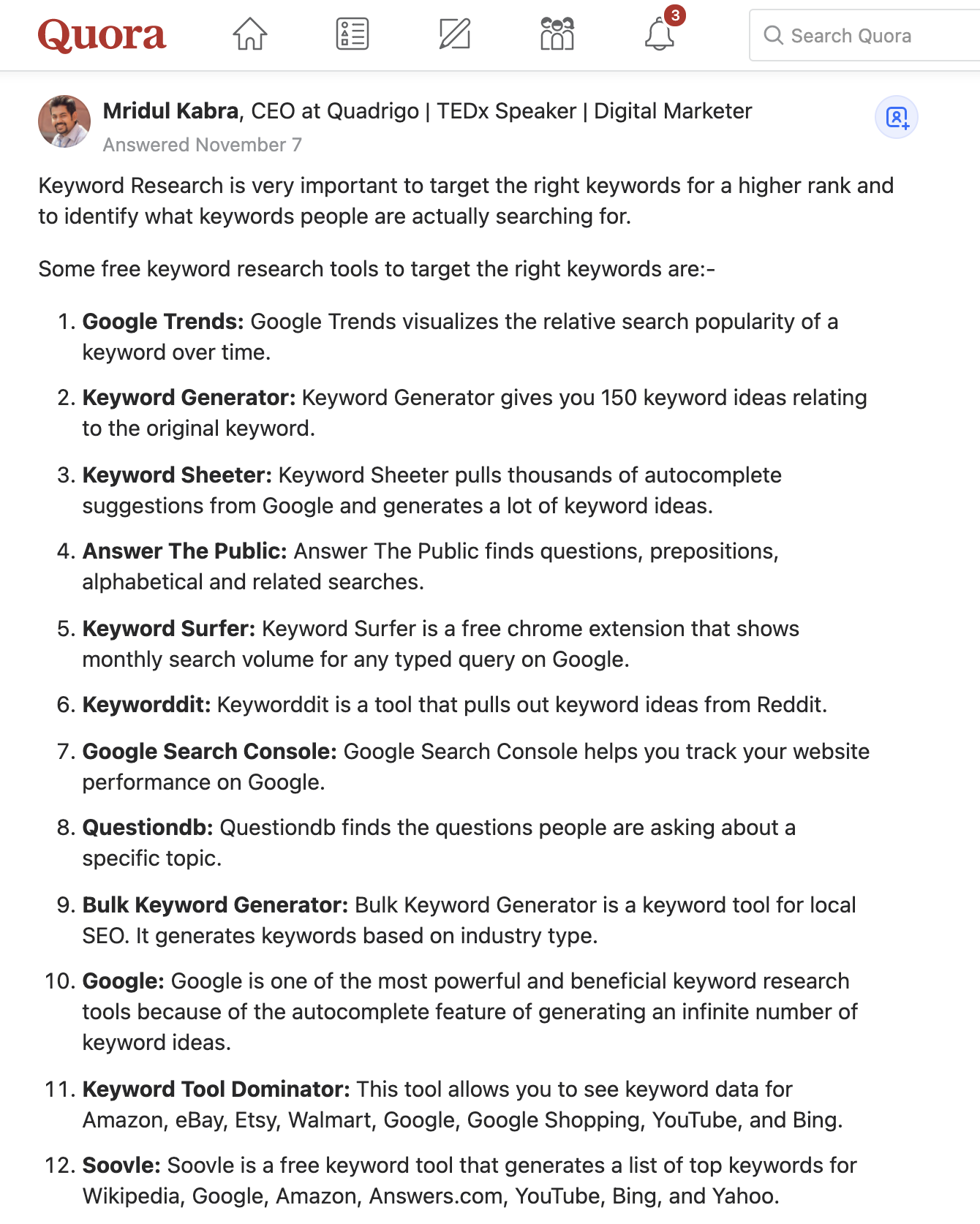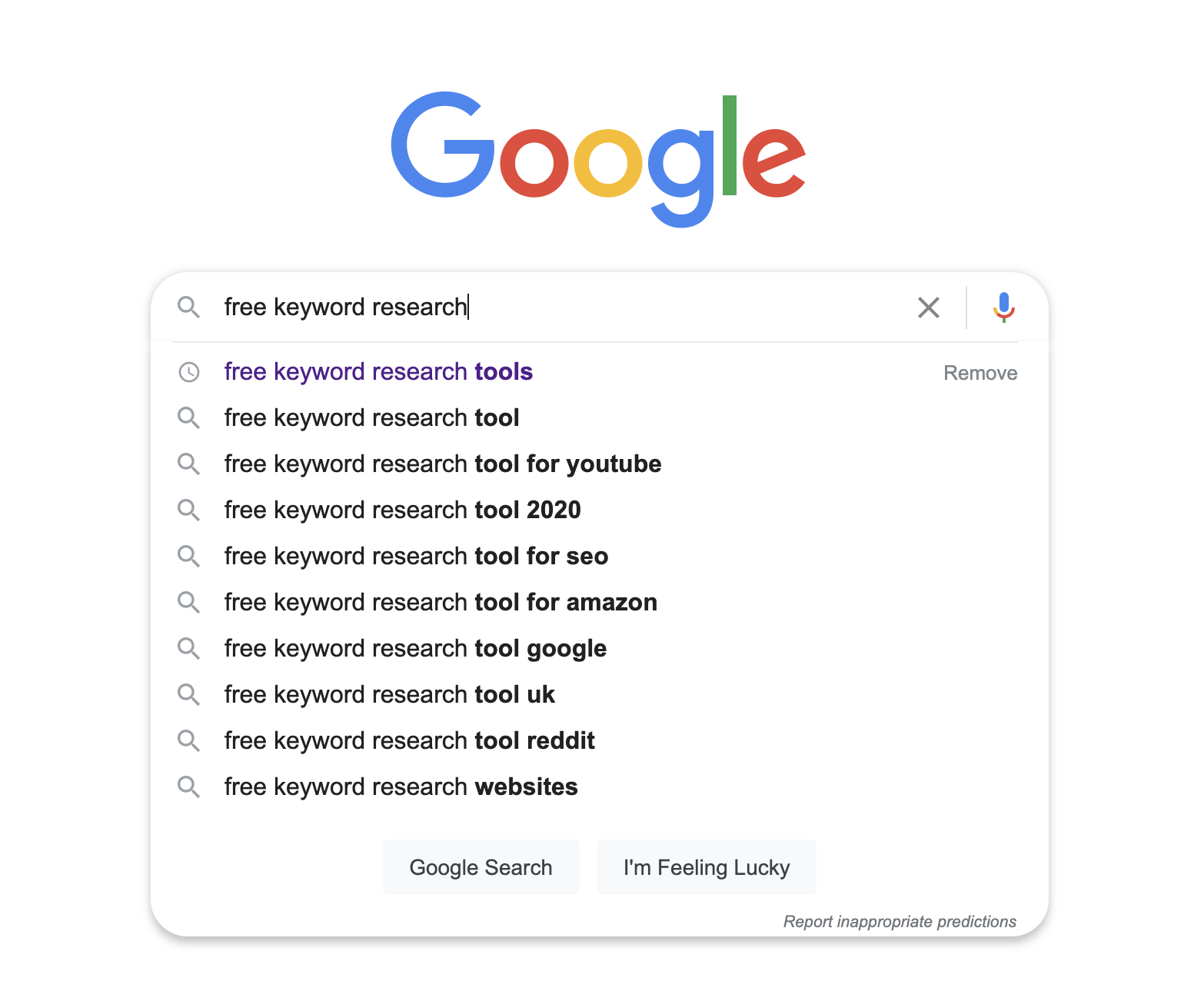Are you trying to get your website or blog to rank, but you don’t have the budget for expensive keyword research tools? Or maybe you’re not really sure where to start? You’ve come to the right place.
There’s an abundance of free keyword research tools that you can use to get started. In this article, we’ll go through each and I’ll show you how I used the tools to determine the primary keyword phrase for this article.
Can you guess what it is? It’s “free keyword research tools.”
Why is keyword research important?
If you’re writing for organic search (i.e. you want to rank on Google), it’s important to do keyword research before you:
Write a blog article
Create content for a landing page
Determine the keywords you want to target for each page of your website
Through keyword research, you can discover the average search volume, competition, SEO difficulty, and paid difficulty for specific keywords or keyword phrases.
Consider user search intent while brainstorming the keywords you'd like to target. What would the person search for in Google?
Without keyword research, you won’t know which keywords or phrases have the most search volume. It’s also important to look at competition and SEO difficulty when choosing the keywords you want to target. Search volume isn't the only factor to consider. Especially if you’re just starting out. Later in this article, we’ll look at how to select the right keywords.
6 Free keyword research tools for SEO
Free keyword research tools make it easy for anyone to explore and identify target keywords and phrases. You can also use some tools to discover content topics. When all else fails, search directly in Google and see what articles come up. Those are the articles you’ll want to try to beat.
Let’s walk through my free keyword research process for this blog article:
1. Free keyword research with Google Keyword Planner
Once you log in to your Google Ads account, go to Tools & Settings > Keyword Planner > Get search volume and forecasts > list variations of your keywords > click “Get Started”
You can look at forecasts, negative keywords, and historical metrics. I usually go straight to historical metrics to get an overview of the average monthly searches and competition.
You’ll see in this search that “free keyword research tools” has more search volume, but also more competition than “free keyword research.” There’s also “best free keyword research tools” — it has lower competition but fewer average monthly searches.
I considered targeting “best free keyword research tools” because the competition is lower, and well, my website doesn’t get a ton of traffic (yet). It’s not like when I write articles for Shopify that rank #1 on Google a few days after they’ve been published. Your domain authority (or score) also plays a role in how well your content ranks on Google. That’s — one of — the reasons why my Shopify articles rank so quickly. The content you put on the page is, of course, also crucial.
In the end, I picked "free keyword research tools" because the search volume is higher and the competition is medium. If it were high, I would have targeted “best free keyword research tools” instead.
2. Free keyword research with Answer The Public
Aside from the strange video of a guy staring at you on the homepage of Answer The Public, this is a great resource to get ideas for sections of your blog article. You can see what questions people are asking about specific topics and keywords and answer those questions throughout your article.
3. Free keyword research with Google Trends
With Google Trends you can compare keywords and keyword phrases to see what’s currently trending. I never use this as my only free keyword research tool, but rather, in tandem with other keyword research tools. You’ll get a graphic visual of search trends.
Its related queries section helps you discover additional topics to write about. For example, “how to do keyword research for SEO” is a breakout keyword phrase meaning it’s beginning to trend more. Now would be a good time for me to write an article about this topic — before everyone else beats me to it and the competition goes up.
📚 Further reading: Mastering Ecommerce SEO: How to Increase Online Store Traffic →
4. Free keyword research with Ubersuggest
Neil Patel’s free keyword research tool, Ubersuggest lets you type in a website or keyword to populate an overview of similar keywords, search volume, SEO difficulty, paid difficulty, and cost per click (CPC). I use it for organic search and look at the trend, volume, and SEO difficulty columns when comparing keywords. The CPC data is helpful if you're working on paid content. You can click through to see the highest-ranking articles for each keyword and also get content ideas.
5. Free keyword research with Quora
Once you know what your primary keywords are, Quora is a place to see what questions and answers are most common. Here’s what came up when I searched “free keyword research tools” in Quora.
From an SEO perspective, I could add more tools to this article based on the responses I found in Quora (it would help the article rank). But I only want to share the free keyword research tools that I currently use.
6. Free keyword research with Google Search
The whole reason to do keyword research in the first place is to rank on Google. This makes Google one of the best free keyword research tools because you can see what’s ranking right now on page one. Its autocomplete feature helps you get an overview of search intent and can spark ideas for blog topics or sections. The “People also ask” section is helpful for determining what questions to answer in your article (or in another blog post).
💡Pro tip: Install the Ubersuggest Chrome extension so you can view monthly searches for your keywords directly in Google. It also lets you see domain authority and visits for the top-ranking articles.
How do I select the right keywords to target?
Selecting the right target keywords isn't only about search volume. It’s important to also look at competition and SEO difficulty. If you’re a smaller company or blog, you can benefit from going after the keywords that have lower competition and lower search volume. With Google Trends, you can see if the keywords are rising in popularity and snatch them up before the rest of the crowd.
When doing keyword research and selection, it’s crucial to consider your audience and their search intent. What information would they find helpful? Is it relevant to your audience or customers? And how will your content benefit them? This is all part of building your content marketing strategy.
If you’re targeting city dwellers and writing about farming best practices, you likely won’t attract the attention of your target audience.
Getting started with free keyword research
Keyword research (free or paid) can feel overwhelming at first and it takes time to rank. It’s key to be consistent (i.e. publish content regularly), write for your readers (not only for search), and keep an eye on your content. If you’re not getting any impressions or clicks you may need to optimize your content.
Generally, you’ll start to see results in four to six months. Over time, you’ll experience more traction and the results after 12 months should be better than what you saw at six months.
Good content takes time to start working for you, but once it does, it continues to improve SEO.
Also read: What is Content Marketing? [+How it Helps Attract Customers] →










